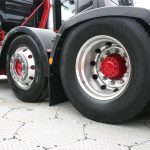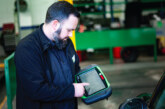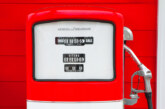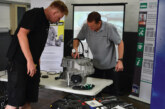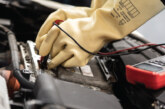Tyres are a key element in road safety and in ensuring commercial vehicles stay roadworthy. Here, Richard Moorse, Head of Technical at TyrePal, explains how to comply with the regulations in place for today’s CV tyres.
It’s easy to overlook tyre condition when it comes to preparing for annual testing and ensuring vehicles are compliant all year round. However, neglecting your tyres compromises road safety, your OCRS score and your bottom line. The only contact a vehicle has with the road is through its tyres, so it’s not hard to understand why the Driver and Vehicle Standards Agency (DVSA) pays especially close attention to the tyres of commercial vehicles.
Tyre pressure
Maintaining safe tyre pressure is particularly important for commercial vehicles. If tyre pressure drops too low it can impact the tyre’s ability to cope with the vehicle’s payload, as well as having a negative impact on fuel efficiency, steering and handling. To avoid these problems and keep vehicles and drivers safe, many UK fleets are adopting tyre pressure monitoring systems (TPMS) to warn drivers when tyre pressure requires adjustment. For example, TyrePal supplies a TPMS that can monitor up to 22 tyres at a time, making it ideal for HGVs.
Direct TPMS models are the most reliable. They use sensors that are fitted either onto the wheel’s valves or inside the tyres. They measure the pressure and temperature in each tyre every twelve seconds and report the results wirelessly to a monitor in the vehicle’s cab. These systems also employ remote monitoring technology, allowing fleet managers to receive reports on the tyre pressure and temperature of the entire fleet. If an out of parameter condition occurs, the TPMS’ monitor emits an alert telling the user what the problem is and where it is located.
Tread depth
A tyre’s tread depth determines the amount of grip a vehicle has with the road surface and impacts the stopping distance, which is why there are different tread patterns for different axles. There is a legal minimum tread depth of 1.6mm across the central three quarters of the tyre and around the circumference for cars, vans, eight-seater vehicles and light trailers up to 3,500kgs in gross vehicle weight.
Any vehicle with a gross vehicle weight or gross train weight over 3,500kgs must have tyres with depth of a least 1mm throughout a continuous band, measuring at least three-quarters of the breadth of the tread and round the entire outer circumference of the tyre.
Official guidelines recommend that you check tyres on a weekly basis for tread depth, tread condition, tread and sidewall damage, as well as signs of irregular wear. Using damaged or worn tyres invalidates insurance policies, incurs fines and endangers drivers and other road users.
OCRS
Tyre pressure and tread depth maintenance also impact an operator’s compliance record. When assessing these records, the DVSA collects data over a three-year period. Illegal tyre tread depth and severe under or over tyre inflation are safety defects that can contribute to a declining operator compliance risk score (OCRS).
Operators with an amber or red OCRS score are more likely to be pulled over and inspected by DVSA or police officers on the roadside — delaying journeys and impacting customer service levels. This has a negative effect on brand reputation, which can result in lost accounts and less repeat business.
PG9s
Vehicles that pose a risk to road safety can be issued with a PG9. For example, if tyre pressure is dangerously low an immediate PG9 prohibition will be issued, stopping the vehicle continuing its journey. Additionally, the driver may face prosecution and the operator is likely to be subject to compliance scrutiny by the DVSA. Low tyre pressure has the biggest impact on whether a PG9 is issued, because, as well as affecting the vehicle’s steering and handling, it will cause the tyre to wear prematurely on the outer edges. An under-inflation of just 6psi can reduce the tread life by 25%.

